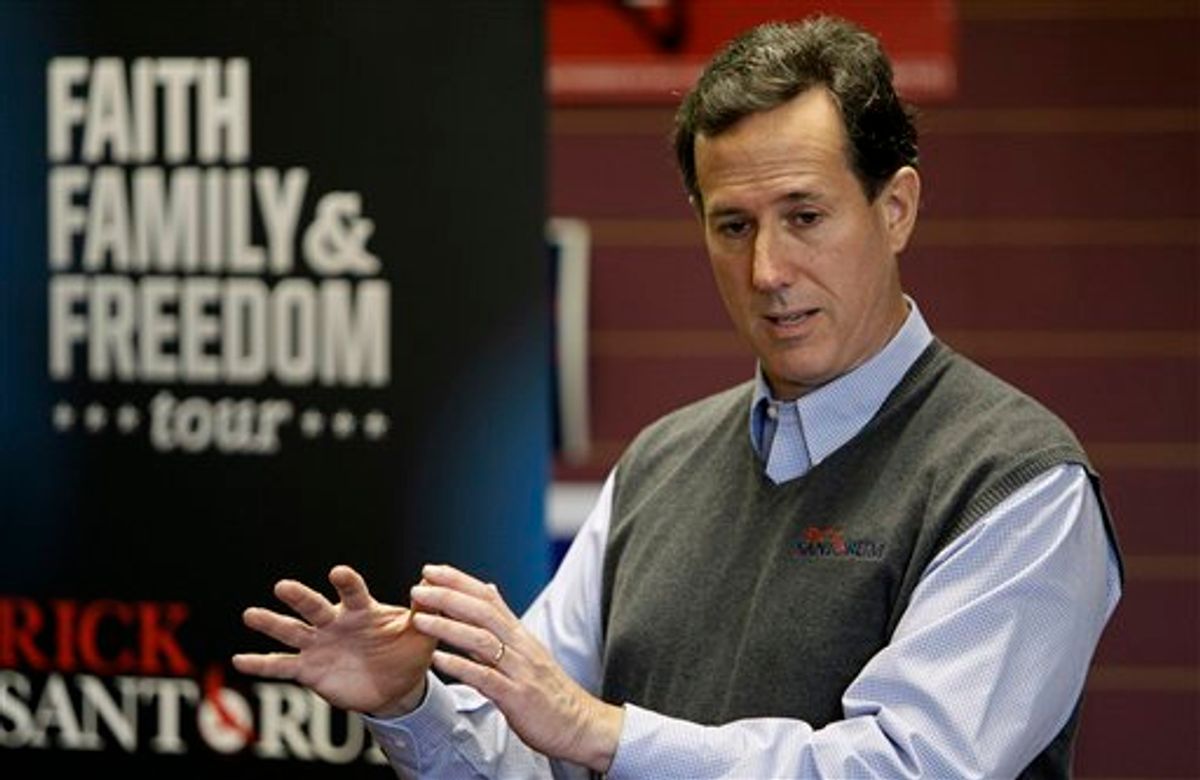Yes, in fact, Rick Santorum is coming for your birth control.
Santorum -- with the help of members of the press, not all of them openly ideological, who take some of his words at face value over others -- is pushing back at the contention in my story that he is "coming for your birth control." When read Salon's headline by the Washington Post's Melinda Henneberger, Santorum replied, "The idea I’m coming after your birth control is absurd. I was making a statement about my moral beliefs, but I won’t impose them on anyone else in this case."
That's clearly refutation enough for Henneberger, who clucks, "Disagree with his stance on birth control all you want; I certainly do, but I’d feel silly pretending to believe he’s going to be even metaphorically riffling through medicine chests and nightstands from coast to coast. If that’s the cleanest shot you’ve got, you might want to wait until a better one comes along." But Santorum's answer shouldn't be enough for anyone who dispassionately evaluates the evidence.
What does it mean to be after America's access to birth control? I noted in my piece that "maybe no one will ever succeed by openly suggesting a contraception ban that would send the condom police into America’s bedrooms." Rather, Santorum's open hostility to contraception laid bare the disconnect between anti-choicers and the American public at large. But in fact, the sum of Santorum's positions comes pretty damn close to suggesting that. I cited his longtime opposition, recently reiterated, to Griswold vs. Connecticut, the crucial Supreme Court case that found a right to privacy in the U.S. Constitution, striking down a birth control ban. I also quoted his own words from October 2011, “One of the things I will talk about, that no president has talked about before, is, I think, the dangers of contraception in this country,” which he termed "not okay." In the same breath, he called these matters among the "important public policy issues” for a president.
Santorum also signed a pledge crafted by Personhood USA, which believes, contrary to any evidence, that the IUD, the morning-after pill and even the birth control bill are abortifacients that should be banned. And he supports the defunding of Planned Parenthood, which provides, among other medical care, contraceptive services to low-income women. In other words, literally taking away their birth control. Is Henneberger's "bonfire of the barrier methods" really the appropriate bar here?
The truly extreme nature of Santorum's position is such that even he seems to realize that he should walk it back now that he's on a bigger stage. But why the Washington Post would feel the need to adopt his posture on its women's blog is a mystery. Henneberger glibly says of Santorum's states' rights gloss on his opposition to Griswold, "This is hardly a new argument." That's true, but it is one that was considered so radical that it helped keep Robert Bork from a Supreme Court seat in 1987. If, in some dystopian turn of events, Rick Santorum were to become president, he would presumably appoint justices who, like him, see no constitutional right to privacy. Even in the Republican context, that's far out of the mainstream. Recall that John Roberts, in his confirmation hearings, affirmed Griswold, saying, "I think if my reading of the precedent is correct, I think every justice on the court believes [in the finding of a right to privacy], to some extent or another." So did Samuel Alito. (Of course, they also saw what happened to Bork.)
Santorum is dangerously wrong on issues that are already settled law in this country. Why pretend otherwise?



Shares